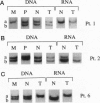Abstract
Parental origin-specific alterations of chromosome 11p15 in human cancer suggest the involvement of one or more maternally expressed imprinted genes involved in embryonal tumor suppression and the cancer-predisposing Beckwith-Wiedemann syndrome (BWS). The gene encoding cyclin-dependent kinase inhibitor p57KIP2, whose overexpression causes G1 phase arrest, was recently cloned and mapped to this band. We find that the p57KIP2 gene is imprinted, with preferential expression of the maternal allele. However, the imprint is not absolute, as the paternal allele is also expressed at low levels in most tissues, and at levels comparable to the maternal allele in fetal brain and some embryonal tumors. The biochemical function, chromosomal location, and imprinting of the p57KIP2 gene match the properties predicted for a tumor suppressor gene at 11p15.5. However, as the p57KIP2 gene is 500 kb centromeric to the gene encoding insulin-like growth factor 2, it is likely to be part of a large domain containing other imprinted genes. Thus, loss of heterozygosity or loss of imprinting might simultaneously affect several genes at this locus that together contribute to tumor and/or growth- suppressing functions that are disrupted in BWS and embryonal tumors.
Full text
PDF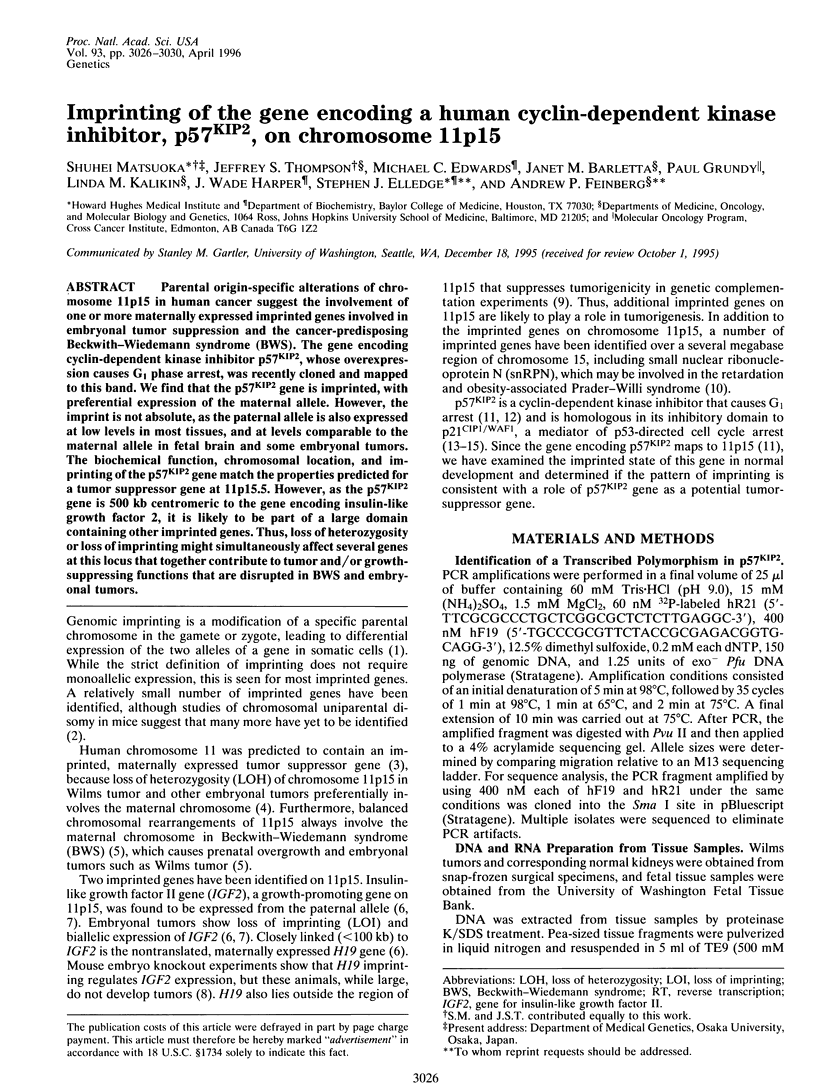
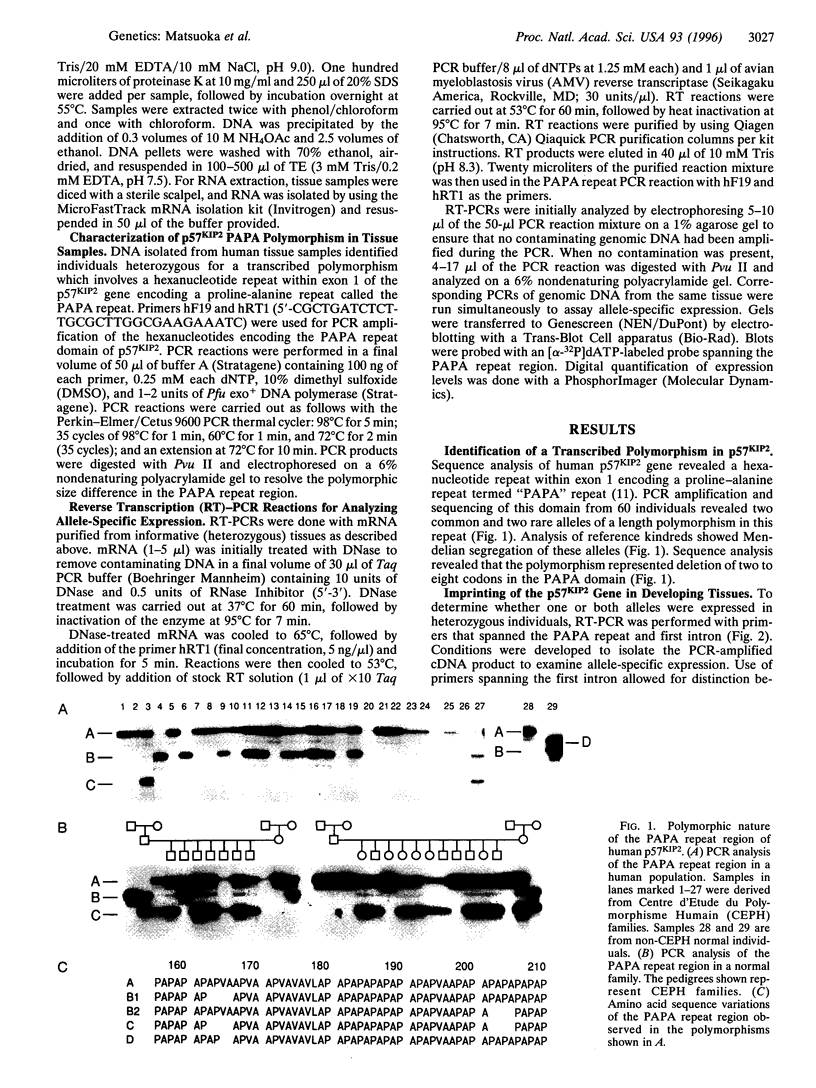
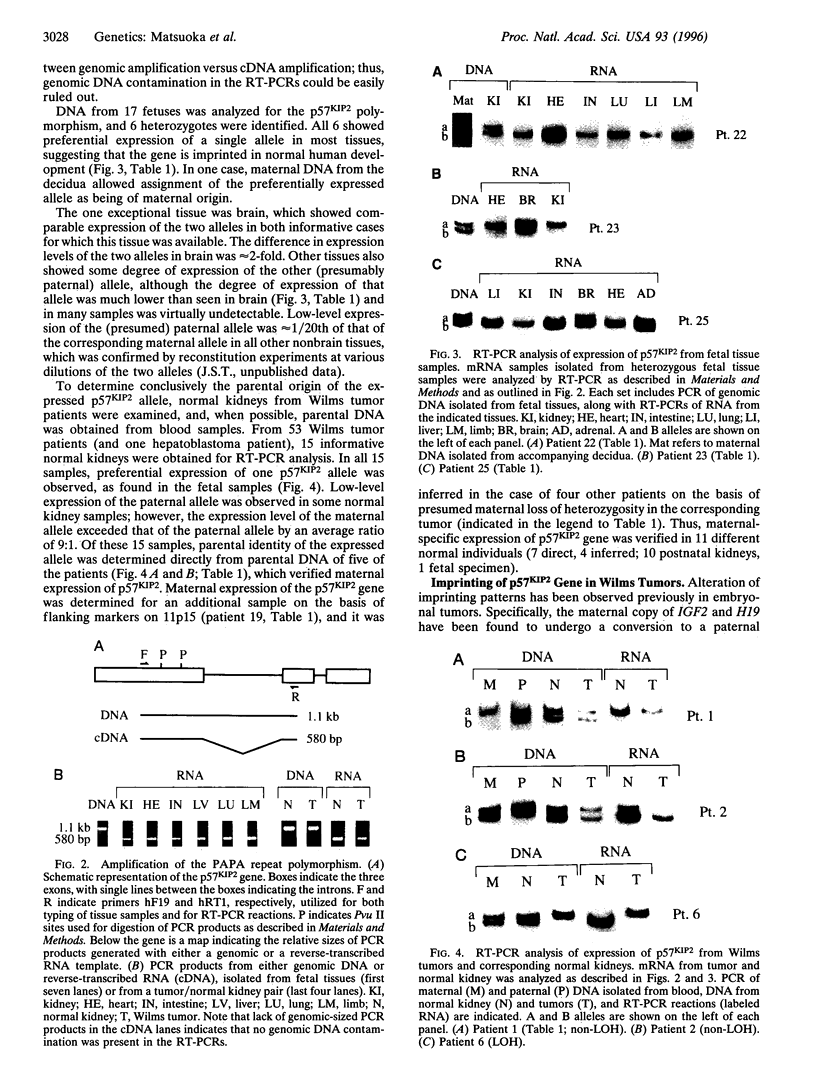
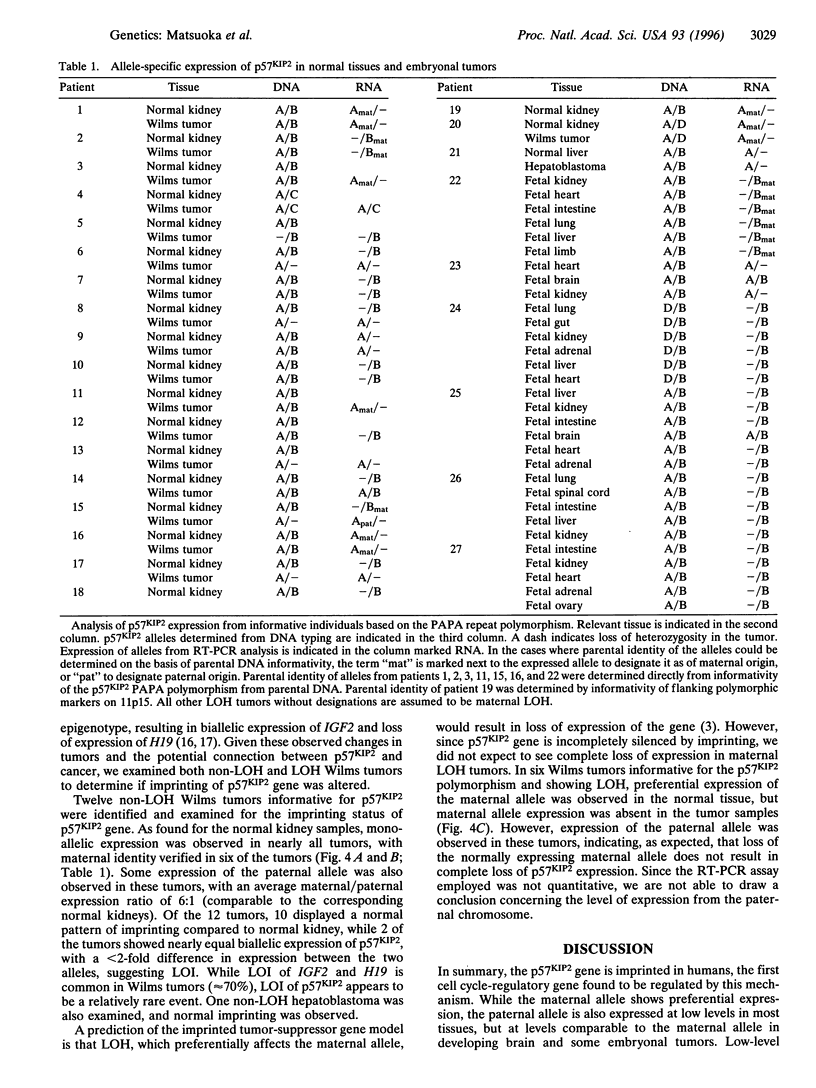
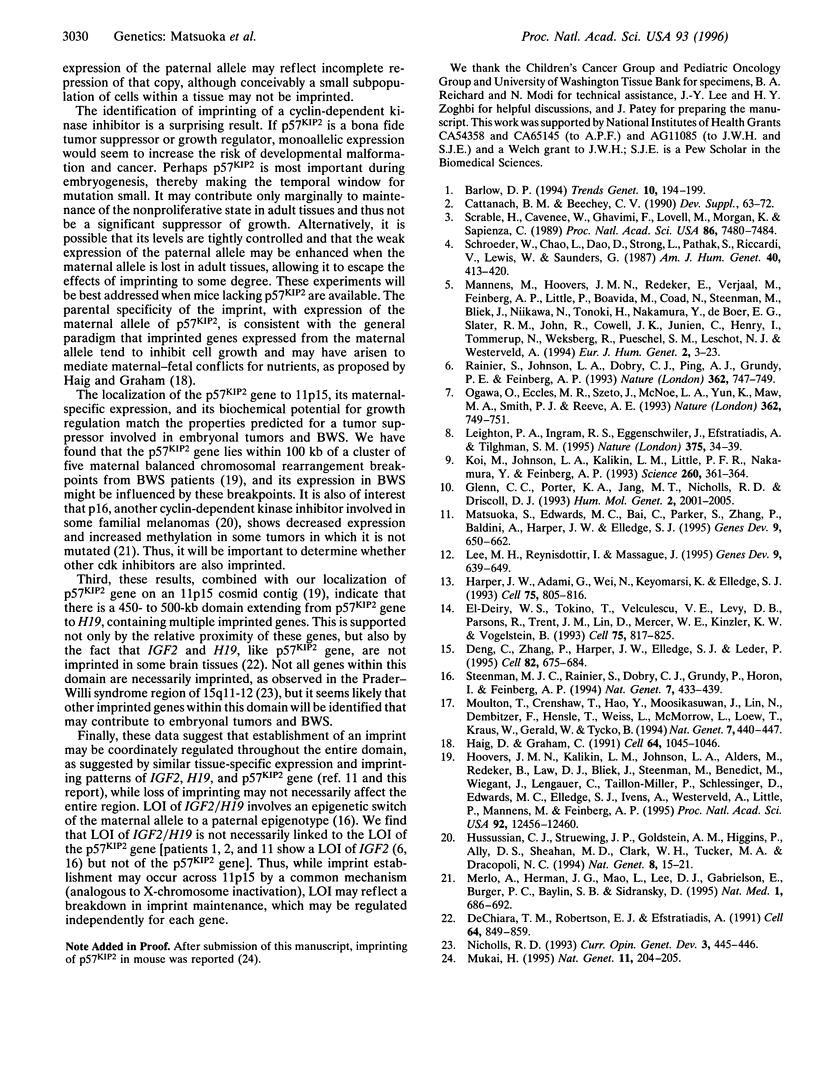
Images in this article
Selected References
These references are in PubMed. This may not be the complete list of references from this article.
- Barlow D. P. Imprinting: a gamete's point of view. Trends Genet. 1994 Jun;10(6):194–199. doi: 10.1016/0168-9525(94)90255-0. [DOI] [PubMed] [Google Scholar]
- Cattanach B. M., Beechey C. V. Autosomal and X-chromosome imprinting. Dev Suppl. 1990:63–72. [PubMed] [Google Scholar]
- DeChiara T. M., Robertson E. J., Efstratiadis A. Parental imprinting of the mouse insulin-like growth factor II gene. Cell. 1991 Feb 22;64(4):849–859. doi: 10.1016/0092-8674(91)90513-x. [DOI] [PubMed] [Google Scholar]
- Deng C., Zhang P., Harper J. W., Elledge S. J., Leder P. Mice lacking p21CIP1/WAF1 undergo normal development, but are defective in G1 checkpoint control. Cell. 1995 Aug 25;82(4):675–684. doi: 10.1016/0092-8674(95)90039-x. [DOI] [PubMed] [Google Scholar]
- Glenn C. C., Porter K. A., Jong M. T., Nicholls R. D., Driscoll D. J. Functional imprinting and epigenetic modification of the human SNRPN gene. Hum Mol Genet. 1993 Dec;2(12):2001–2005. doi: 10.1093/hmg/2.12.2001. [DOI] [PubMed] [Google Scholar]
- Haig D., Graham C. Genomic imprinting and the strange case of the insulin-like growth factor II receptor. Cell. 1991 Mar 22;64(6):1045–1046. doi: 10.1016/0092-8674(91)90256-x. [DOI] [PubMed] [Google Scholar]
- Harper J. W., Adami G. R., Wei N., Keyomarsi K., Elledge S. J. The p21 Cdk-interacting protein Cip1 is a potent inhibitor of G1 cyclin-dependent kinases. Cell. 1993 Nov 19;75(4):805–816. doi: 10.1016/0092-8674(93)90499-g. [DOI] [PubMed] [Google Scholar]
- Hatada I., Mukai T. Genomic imprinting of p57KIP2, a cyclin-dependent kinase inhibitor, in mouse. Nat Genet. 1995 Oct;11(2):204–206. doi: 10.1038/ng1095-204. [DOI] [PubMed] [Google Scholar]
- Hoovers J. M., Kalikin L. M., Johnson L. A., Alders M., Redeker B., Law D. J., Bliek J., Steenman M., Benedict M., Wiegant J. Multiple genetic loci within 11p15 defined by Beckwith-Wiedemann syndrome rearrangement breakpoints and subchromosomal transferable fragments. Proc Natl Acad Sci U S A. 1995 Dec 19;92(26):12456–12460. doi: 10.1073/pnas.92.26.12456. [DOI] [PMC free article] [PubMed] [Google Scholar]
- Hussussian C. J., Struewing J. P., Goldstein A. M., Higgins P. A., Ally D. S., Sheahan M. D., Clark W. H., Jr, Tucker M. A., Dracopoli N. C. Germline p16 mutations in familial melanoma. Nat Genet. 1994 Sep;8(1):15–21. doi: 10.1038/ng0994-15. [DOI] [PubMed] [Google Scholar]
- Koi M., Johnson L. A., Kalikin L. M., Little P. F., Nakamura Y., Feinberg A. P. Tumor cell growth arrest caused by subchromosomal transferable DNA fragments from chromosome 11. Science. 1993 Apr 16;260(5106):361–364. doi: 10.1126/science.8469989. [DOI] [PubMed] [Google Scholar]
- Lee M. H., Reynisdóttir I., Massagué J. Cloning of p57KIP2, a cyclin-dependent kinase inhibitor with unique domain structure and tissue distribution. Genes Dev. 1995 Mar 15;9(6):639–649. doi: 10.1101/gad.9.6.639. [DOI] [PubMed] [Google Scholar]
- Leighton P. A., Ingram R. S., Eggenschwiler J., Efstratiadis A., Tilghman S. M. Disruption of imprinting caused by deletion of the H19 gene region in mice. Nature. 1995 May 4;375(6526):34–39. doi: 10.1038/375034a0. [DOI] [PubMed] [Google Scholar]
- Mannens M., Hoovers J. M., Redeker E., Verjaal M., Feinberg A. P., Little P., Boavida M., Coad N., Steenman M., Bliek J. Parental imprinting of human chromosome region 11p15.3-pter involved in the Beckwith-Wiedemann syndrome and various human neoplasia. Eur J Hum Genet. 1994;2(1):3–23. doi: 10.1159/000472337. [DOI] [PubMed] [Google Scholar]
- Matsuoka S., Edwards M. C., Bai C., Parker S., Zhang P., Baldini A., Harper J. W., Elledge S. J. p57KIP2, a structurally distinct member of the p21CIP1 Cdk inhibitor family, is a candidate tumor suppressor gene. Genes Dev. 1995 Mar 15;9(6):650–662. doi: 10.1101/gad.9.6.650. [DOI] [PubMed] [Google Scholar]
- Merlo A., Herman J. G., Mao L., Lee D. J., Gabrielson E., Burger P. C., Baylin S. B., Sidransky D. 5' CpG island methylation is associated with transcriptional silencing of the tumour suppressor p16/CDKN2/MTS1 in human cancers. Nat Med. 1995 Jul;1(7):686–692. doi: 10.1038/nm0795-686. [DOI] [PubMed] [Google Scholar]
- Moulton T., Crenshaw T., Hao Y., Moosikasuwan J., Lin N., Dembitzer F., Hensle T., Weiss L., McMorrow L., Loew T. Epigenetic lesions at the H19 locus in Wilms' tumour patients. Nat Genet. 1994 Jul;7(3):440–447. doi: 10.1038/ng0794-440. [DOI] [PubMed] [Google Scholar]
- Nicholls R. D. Genomic imprinting and candidate genes in the Prader-Willi and Angelman syndromes. Curr Opin Genet Dev. 1993 Jun;3(3):445–456. doi: 10.1016/0959-437x(93)90119-a. [DOI] [PubMed] [Google Scholar]
- Ogawa O., Eccles M. R., Szeto J., McNoe L. A., Yun K., Maw M. A., Smith P. J., Reeve A. E. Relaxation of insulin-like growth factor II gene imprinting implicated in Wilms' tumour. Nature. 1993 Apr 22;362(6422):749–751. doi: 10.1038/362749a0. [DOI] [PubMed] [Google Scholar]
- Rainier S., Johnson L. A., Dobry C. J., Ping A. J., Grundy P. E., Feinberg A. P. Relaxation of imprinted genes in human cancer. Nature. 1993 Apr 22;362(6422):747–749. doi: 10.1038/362747a0. [DOI] [PubMed] [Google Scholar]
- Schroeder W. T., Chao L. Y., Dao D. D., Strong L. C., Pathak S., Riccardi V., Lewis W. H., Saunders G. F. Nonrandom loss of maternal chromosome 11 alleles in Wilms tumors. Am J Hum Genet. 1987 May;40(5):413–420. [PMC free article] [PubMed] [Google Scholar]
- Scrable H., Cavenee W., Ghavimi F., Lovell M., Morgan K., Sapienza C. A model for embryonal rhabdomyosarcoma tumorigenesis that involves genome imprinting. Proc Natl Acad Sci U S A. 1989 Oct;86(19):7480–7484. doi: 10.1073/pnas.86.19.7480. [DOI] [PMC free article] [PubMed] [Google Scholar]
- Steenman M. J., Rainier S., Dobry C. J., Grundy P., Horon I. L., Feinberg A. P. Loss of imprinting of IGF2 is linked to reduced expression and abnormal methylation of H19 in Wilms' tumour. Nat Genet. 1994 Jul;7(3):433–439. doi: 10.1038/ng0794-433. [DOI] [PubMed] [Google Scholar]
- el-Deiry W. S., Tokino T., Velculescu V. E., Levy D. B., Parsons R., Trent J. M., Lin D., Mercer W. E., Kinzler K. W., Vogelstein B. WAF1, a potential mediator of p53 tumor suppression. Cell. 1993 Nov 19;75(4):817–825. doi: 10.1016/0092-8674(93)90500-p. [DOI] [PubMed] [Google Scholar]







